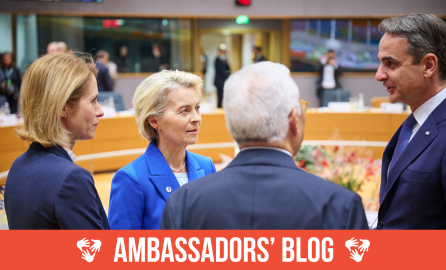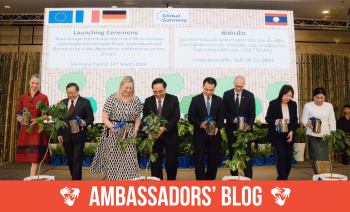The decline of traditional multilateralism is a global reality
We live in an increasingly multipolar and less multilateral world. Perhaps, more urgently than ever, international cooperation professionals are witnessing the necessity to join their efforts in supporting sustainable development, peace and mutual understanding initiatives. With the latest geopolitical events, violent conflicts and complex humanitarian crises affecting the lives of millions of people across Europe and beyond, the longest period of global stability and human development has come to an end. The post-Cold War consensus, that upheld global cooperation, is giving way to a new world settlement characterised by intensified competition among big powers, the fragmentation of global governance institutions, the resurgence of regionalism and bilateralism, as well as widening geopolitical divides caused by conflict, disinformation and economic nationalism.
The shift in diplomacy is confirmed by the latest evolutions: Russia has been strengthening ties with nations that challenge US influence, while China is developing its own framework for international cooperation, particularly in the economic and financial domains. Alas, at the heart of this transformation lies a harsh truth: no country, no matter how powerful, can address today’s complex challenges alone—from climate change and pandemics to forced migration and digital threats. This reality reaffirms the strategic relevance of multilateral diplomacy and highlights the unique position of international cooperation professionals in shaping more inclusive, effective, and resilient international cooperation.
The stakes are even higher for those of us working in or with the European Union. As a global actor and a normative power, the EU must address this fragmentation without losing its foundational commitment to peace, solidarity, and sustainable development.
When reflecting on multilateralism, the pressing question becomes: to what extent has multilateral diplomacy eroded, and how can international cooperation professionals, particularly in the EU context, help reshape it for the future?
While multilateralism was once the preferred framework for managing global risks and enabling collective, coordinated action, today, it faces systemic obstacles, like - but not limited to - the following:
-
The UN Security Council remains gridlocked on critical resolutions, including those addressing pandemics or conflicts.
-
Global trade negotiations, such as the Doha Development Round, have stalled indefinitely.
-
Climate summits, including COP26 and COP27 have struggled to deliver binding commitments on major issues like fossil fuels reduction or forest protection.
The list continues.
Further, the COVID-19 pandemic exposed critical limitations of the multilateral system. For instance, fragmented responses, vaccine inequity, and uneven recovery highlighted how current mechanisms fall short in delivering timely and effective solutions.
Despite all these shortcomings, the need for multilateral coordination has never been greater. When major events disrupt the way a society—or even an entire continent—functions, multilateralism becomes not just an option but a necessity. It creates space for conflict prevention, peacebuilding, and long-term resilience. The European Union itself is a living example of multilateralism in action—once a war-torn continent, now an alliance working toward integration, solidarity, and shared values.
Tips for international cooperation professionals to meaningfully integrate their role into international work
International cooperation professionals operate at the intersection of diplomacy, policy and implementation. Especially in this transition period, they have an important role to play in delivering effective and innovative cooperation tools and outcomes.
Here are six strategic reference points for professionals seeking to contribute their knowledge in the changing diplomatic environment:
1. Embed the EU’s external action priorities in the project design of cooperation initiatives
The EU’s Global Gateway, the European Green Deal, Global Europe with its Team Europe backbone approach are not just funding sources but an expression of strategic diplomacy. International cooperation professionals can position cooperation actions as extensions of EU values and partnerships to increase project relevance and enhance the likelihood of funding, especially in fragile contexts. Also, by referencing EU strategies (e.g., the Africa-EU Partnership, the EU Indo-Pacific Strategy, etc.), the initiatives become more policy-related and coherent. This approach has the potential to strengthen the legitimacy of international cooperation work with EU delegations and partners.
2. Engage non-traditional and local actors in multilateral development initiatives
Central government partnerships are at the core of international cooperation initiatives. However, multilateralism today requires more than dialogue among states. It demands new coalitions of actors – from municipalities to universities, from social enterprises to civic tech innovators. These actors are increasingly influential in shaping long-term outcomes and ensuring sustainability. This also reflects the EU’s commitment to inclusive multilateralism and creates momentum for systemic change with long-term effects. International cooperation professionals can build consortia under Horizon Europe, Interreg, or Creative Europe calls that include NGOs, local authorities, research institutions and small and medium-sized enterprises (SMEs). Further, this will promote cross-border partnerships and regional integration through tools like Twinning, TAIEX, or Pre-Accession Mechanisms.
3. Support the reform agenda of multilateral institutions in a sustainable way
Every day, global tensions rise, and polarisation threatens international cooperation, reaffirming that commitment to multilateral diplomacy is an ethical and strategic imperative. We must invest in dialogue rather than division, in shared security rather than isolated interests. Peace is not merely the absence of conflict but the presence of justice, equity, and opportunity—achievable only through united efforts.
The EU’s commitment to the 2030 Agenda and the European Consensus on Development requires that trade, migration, climate and security policies do not undermine cooperation outcomes. International cooperation professionals can integrate a ‘Policy Coherence for Sustainable Development’ lens into project needs assessment, demonstrating how sectoral policies interlink with local priorities. An international cooperation professional, then, becomes a systems thinker, i.e. someone who helps beneficiaries and institutions understand complexity and act responsibly across silos.
4. Develop geopolitical intelligence and adaptive intervention strategies
Nowadays, international cooperation work cannot be decoupled from global politics. Even though multilateral diplomacy involves nations, international organisations and civil society, it has evolved from negotiating solutions to resolving disputes and committing collective actions. That’s why the purpose of preventing war has been left behind in favour of building foundations for a peaceful world through cooperation, respect, dignity and inclusivity. These transversal priorities support the integration of conflict sensitivity, climate adaptation and institutional resilience into project methodologies.
Today’s international cooperation interventions must go beyond service delivery to strengthen social cohesion and mitigate possible tensions. International cooperation professionals can conduct regular political economy analyses with geopolitical risk assessment, map power dynamics, identify where EU influence can be constructive, and adjust to account for evolving diplomatic alignments. This approach is extremely effective when anticipating disruptions and makes the work of an international cooperation professional more strategic to both donors and implementing partners.
5. Uphold the EU’s role as a normative power
From human rights and the rule of law to digital ethics and green transitions, the EU funds cooperation initiatives and shapes norms, providing regional cooperation mechanisms (e.g., EU Neighbourhood Policy). International cooperation professionals can reflect this normative role in both content and delivery. For instance, the projects must explicitly promote democratic governance, human rights-based and participatory approaches. This is functional when integrating gender mainstreaming, digital inclusion and cross-cutting themes. An efficient method to support the EU’s role as a normative power is to engage with the EU Charter of Fundamental Rights and other legal frameworks in project design. This helps create projects that resonate with the EU’s values-based diplomacy to enhance credibility and long-term impact.
6. Actively participate in the debate on multilateral reform
The EU has been vocal in international fora, calling for reforms to multilateral institutions. For example, the Bridgetown Initiative calls to reshape the UN Security Council, while debates around the effectiveness of the WTO and WHO affect the international cooperation landscape. International cooperation professionals, as promoters of innovation, must stay informed on reform proposals (e.g., via platforms like Capacity4Dev and the Team Europe Explorer), organise, and participate in, policy dialogue with EU institutions, think tanks, or networks like the European Think Tank Group.
Conclusion
Without any doubt, international cooperation professionals play a key role in shaping the future of multilateralism and diplomacy for peace and in ensuring that reforms reflect on-the-ground realities and practitioner’s insights. In an era of rapid global changes, international cooperation professionals must evolve from project implementers to strategic actors in multilateral diplomacy. The EU remains a global catalyst of multilateralism: it balances diversity with unity, values with economic interest, and peace with power. Professionals who understand this complexity translate it into effective cooperation and shape what we hope will be a bright future of international cooperation.
Let us not merely adapt to the new order but help shape it effectively. One partnership, one project and one principled intervention at a time.





Log in with your EU Login account to post or comment on the platform.